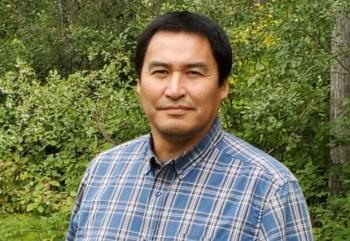Image Caption
Summary
Local Journalism Initiative Reporter
Windspeaker.com
The man who initiated court action against Acho Dene Koe First Nation (ADKFN) in the Northwest Territories because of delayed elections has had his nomination for chief dismissed.
Former chief Floyd Bertrand has now initiated a second court action so he can be included on the April 26 ballot.
Bertrand is being told that a debt owing of $27,551 from 2005 makes him ineligible to run, according to the First Nation’s custom election code.
“Other than a spread sheet and a PDF, we have seen no documents to substantiate this alleged debt. We are therefore, again, having to go to federal court,” said Bertrand’s legal counsel Orlagh O’Kelly of Field Law.
O’Kelly says it is important for Bertrand to take action now because the nation does not have a ratified customary election code and the route to appealing the decision is “ambiguous.”
“There is no appeal committee and if there is no appeal committee the federal court has no jurisdiction, so he could potentially lose the right to challenge it if he doesn't do it before,” she said.
In court documents filed March 5, 2021, O’Kelly argues that the 2007 election code was proposed but never ratified. However, if it is to be considered valid customary law “it cannot be said that ADKFN custom has debt requirement or an appeal mechanism.”
O’Kelly also argues that the 2021 election process was amended Feb. 9, 2021 in a Facebook post. Bertrand says he was unaware of any member consultation or notice prior to this amendment.
“The nomination period was amended to now close on March 2, 2021. No amendments were made to address the concerns of debt disclosure or opportunity to repay the same,” says the court documents.
The origin of the $27,551.94 debt is also being questioned. Bertrand was made aware of the debt in 2015. He received no invoices to support the debt and the timing of the amount corresponds to payments made to him during his term as chief of ADKFN. “There is no indication why the payments were made and no indication that there was an obligation to repay,” states the court documents.
Bertrand is seeking an order from the federal court to have his name added to the ballot as chief for the 2021 election.
Bertrand is not asking for the election to be delayed considering his initial court action was to force chief and council to hold an election. That court action is referenced as part of the Statement of Facts in Bertrand’s challenge of his exclusion from running in the April election.
O’Kelly initiated court action in October 2020 on behalf of Bertrand, who challenged Chief Gene Hope and council for postponing band elections. There has been no election since 2017. The election was supposed to be held in May 2019.
Hope and council cited coronavirus pandemic measures and regulations put in place by Indigenous Services Canada (ISC) in April 2020 in the First Nations Election Cancellation and Postponement Regulations (Prevention of Diseases) for reason to postpone the election. Those measures allow a band to delay the election for up to six months, although that term may be extended once. ADKFN chief and council have delayed the election twice.
O’Kelly argues that ISC does not have the jurisdiction to delay the election by regulation nor do they have the ability to delegate the decision-making authority to another decision maker, in this case band council, as this is a conflict of interest.
Bertrand will not be standing alone in this fight.
The Band Members Alliance and Advocacy Association of Canada (BMAAAC) was granted intervener status March 12 despite ADKFN opposing the motion and the Attorney General of Canada taking no position.
“We say that it’s because this decision could be binding on other cases; that we’re hoping the court will take note of the bigger picture of the chief and council’s authority in Canada,” said Rob Louie, president of BMAAAC.
The BMAAAC is a newly created organization that offers its services free of charge to band members who have concerns about alleged unethical behaviour of leadership. Louie points out that at no time is he aware of the band council having consulted the people regarding extension of their terms.
“To become an intervener one of the conditions is that our submission is different and useful and it offers perspectives that will further the court’s determinations of legal issues raised by the parties in the proceeding. Extending of band councils’ term of office transcends the issue because it applies to other band councils in Canada,” said Louie.
In the six-page decision rendered today by Case Management Judge Kathleen M. Ring, she writes that she is satisfied “that BMAAAC will bring a different and useful perspective that will further the court’s determination of the legal issues raised by the parties…”
This is the first time the court will be considering the First Nations Election Cancellation and Postponement Regulations.
BMAAAC is co-applicants for two other court actions: Lisa Crookedneck v. Ministikwan Lake Cree Nation and Philicia Clay v. Mosquito-Grizzly Bear Head-Lean Man First Nation challenging the federal election postponement regulations. No dates have been set for when these will be heard in federal court.
O’Kelly says BMAAAC’s involvement as an intervener highlights that this issue is “a problem happening across the country.”
Both Bertrand’s argument to allow his name to be placed on the ballot for chief and ADKFN’s postponed elections, including consideration of the First Nations Cancellation and Postponement Regulations, will be heard on March 22 and March 23 in federal court.
Local Journalism Initiative Reporters are supported by a financial contribution made by the Government of Canada.

